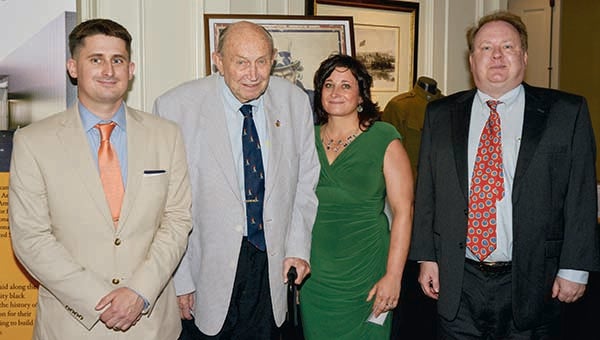Franklin native earns national history honor
Published 11:03 am Friday, July 4, 2014

Major Wilson Blythe Jr., Lt. Gen. (Ret.) Trefry, Lt. Col. Lacey and Matt Seelinger of the Army History Foundation. — SUBMITTED | FRANK LEE RUGGLES
WASHINGTON, D.C.—Growing up, there was never any doubt in what he wanted to do — he wanted to join the armed services.
“I wasn’t a military brat,” said Maj. Wilson Blythe Jr., originally of Franklin, as his father, Wilson Blythe Sr., had worked for IP-Union Camp. “It was probably just reading about it. I have always had a love for history, and I think it just fit into things.”
And with that also came a love for writing about history. Blythe recently won an award for an article titled, “Arthur L. Wagner: Military Educator and Modernizer,” which he had submitted to the Winter 2013 edition of the journal Army History.
Receiving the award from the Army Historical Foundation Inc. was more than he had ever expected.
“It was like ‘Godzilla’ winning best picture,” Blythe said. “It wasn’t even the cover article in the magazine. I was pretty flattered and surprised.”
The article was his doctoral dissertation on Wagner, an Army brigadier general from late 19th- to early 20th-century.
“When you think about root reforms, you think about Emory Upton,” Blythe said about the Civil War-era major general who wrote The Military Police of the United States. “Wagner is not as well known, but he really took a lot of those ideas that Upton had, and adapted them to the circumstances and political institutions of the day so that they would work.
“He really did a lot to professionalize military education.”
Blythe said he has always been interested in the U.S. Army. In April, 1997, his junior year at Franklin High School, he joined the army reserves.
“I basically knew I wanted the Army to be my profession,” he said. “I thought it would be useful for me to experience being led, so I could understand that perspective better — what troops went through, the units and their experiences.”
In 1998, he graduated high school and went to the University of Mississippi in Oxford to major in history and be a part of the Reserve Officers’ Training Corps program.
“My grandparents live fairly close by in New Albany, so it was a good balance from being away from home but still close to family,” he said.
From there, the field artillery officer made several stops, including Oklahoma and Texas twice, South Korea, Iraq, Afghanistan, where he helped train the nation’s national army, and now he is in Washington, D.C., at the National Defense University at Ft. McNair.
“I was in Ft. Sill, Oklahoma, teaching at the captain’s career course artillery school, when I got an email one day,” Blythe said. “It was from a colonel up here in D.C. who had read the article, and he asked how I would feel about coming up here for the next two to three years to research and write military history? I said, ‘Heck yeah!’”
The book he is contributing to, which is on Operation Iraqi Freedom, should be out in 2015.
The ability to attend grad school came in 2007 when the army had a program because it was short captains. Of the options presented, Blythe chose to go to grad school.
“When I was trying to decide, I contacted one of my professors at Ole Miss about where I should go to school,” he said. “He asked me if I still read a lot of military history. If so, to think about studying somewhere with a professor whose work I like. Robert Citino, a German military historian, taught at Eastern Michigan, and the school met the military’s criteria.”
After completing his master’s degree in history at the University of Eastern Michigan in 2010, he was transferred to Ft. Bliss in El Paso.
On his way there, he stopped by the University of North Texas, where Citino had transferred, and decided he’d work on completing his doctorate in history.
“I figured that I was going to be reading military history anyway, so why not get some credit in it?” Blythe said. “I just enjoy learning new things. The ideas that are behind what these figures, these organizations, did that drove their assumptions. The way they solve the world. I just find it real interesting.”





